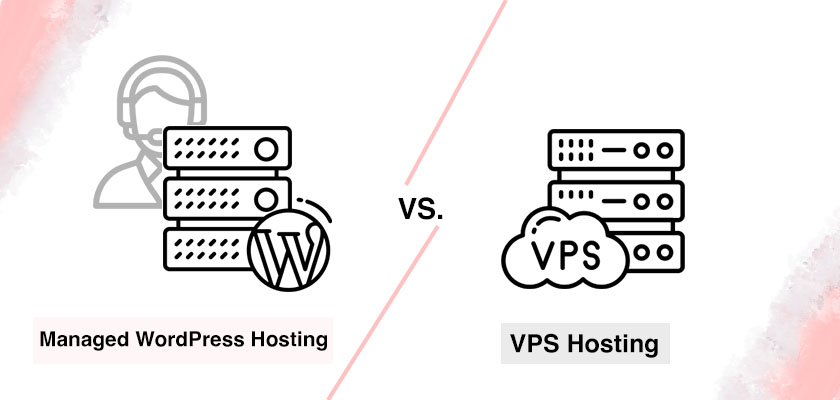
This article will assist you in deciding whether you should opt for a VPS (Virtual Private Server) or managed WordPress hosting. Does it really matter?
The wrong choice of hosting can cost your time and money and could have other consequences. You shouldn’t be the first one to consider what is the best option. Finding several hosting options offered by different providers is confusing and can be frustrating.
To assist you in making the right decision, in this article, we’ll look at comparing VPS hosting vs WordPress hosting, and discuss both their advantages and disadvantages and also which will best suit your needs. This will assist you in determining the best option for your company and you. Furthermore, we’ll talk about managed WordPress hosting and unmanaged WordPress hosting. It’s best if you know what server you need before you actually buy VPS hosting or buy managed WordPress hosting.
What Is WordPress Hosting?
WordPress Hosting provides a single-tenant or shared hosting system that has been specifically designed and tuned for WordPress websites.
While a VPS is with a pre-configured configuration to be used in general usage, WordPress Hosting is designed specifically for WordPress. There are a variety of ways to set up a server and its software. WordPress Hosting eliminates any guesswork in the procedure.
Since the framework is built from scratch to run WordPress, there is no need to think about frameworks and software that are running on other websites and applications.
Additionally, any software that is integrated into the server is specifically intended for WordPress or indirectly helps it to run efficiently. The most important thing is to offer maximal performance without having to manage servers.
Benefits of WordPress Hosting
The performance is a huge benefit for WordPress Hosting. The fact that the entire environment is focused on a specific type of hosting implies that the entire infrastructure is optimized to provide the highest performance. You can certainly use other plugins if you want to; however, the functionality that comes with the box is appropriate for most WordPress websites.
Another benefit of WordPress Hosting lies in the fact that you do not have to manage servers. As you probably know, most hosting providers build their WordPress services to let web designers and other agencies concentrate on their websites. And it’s been a few years since managed WordPress hosting has been going around as one of the greatest options for people who aren’t that tech savvy and looking to invest in a VPS.
Security is a major benefit that comes with WordPress Hosting. Because WordPress infrastructure has to deal with any services that are not required for the operation of WordPress and need to be turned off, if you add this to periodic updates for your WordPress core and plugins, you’ll be in a secure environment.
Who Needs WordPress VPS Hosting?

So WordPress vs VPS Hosting, who needs what? VPS hosting is particularly beneficial to those who are technically proficient and looking for a customized hosting platform but don’t have the resources to buy dedicated servers.
WordPress VPS hosting performs the same functionality as regular VPS hosting; however, there is a slight difference in that it’s specifically tailored to the requirements of WordPress.
Although shared hosting is sufficient to fulfil the requirements of small-sized blogs and websites, VPS hosting also targets medium-sized and large websites or, in other words, websites with greater ambitions regarding the functionality of their website and anticipated traffic.
Furthermore, with VPS hosting, you’ll get greater access, giving you the possibility of expanding the functionality of your hosting by adding new software. This isn’t something you’ll be able to accomplish using shared hosting because you do not have the connectivity to your server. Thus, in the case of WordPress hosting vs VPS hosting, which one would you choose?
What Is VPS Hosting?
VPS Hosting (Virtual Private Server) is a dynamic hosting server virtualized that is located within an existing server that is hosted on a cloud-based infrastructure.
Usually, there is a group of servers that form the infrastructure of the VPS. The VPS instances themselves are distinct components of the parent server, with their own resources.
In most cases, you’ll be able to access Root and Secure Shell (SSH) and Secure File Transfer Protocol (SFTP). Many managed service providers offer the software installer, for instance, Softaculous for installing popular server software as well as Content Management Systems (CMS). WordPress is one of these CMS that can be easily installed on the VPS.
VPS hosting usually comes with the resources allocated for each server instance. The majority of VPS offers are single tenants; that is, RAM, CPU, and storage are devoted to one owner/user instead of being shared between numerous users. The operating system options are diverse, including varieties of Linux and Windows.
Benefits of VPS Hosting
The main benefit of VPS Hosting comes from access to your servers. Having root access and being able to communicate via your Operating System and server stack allows for customization of the server, in addition to your websites and applications. Managed web hosting providers offer you assistance for the majority of server-side features.
Another benefit that comes with VPS Hosting lies in the possibility of upgrading the server to increase the number of resources required. The way you upgrade your server differs among providers; however, all offer options to give you the performance you require.
Root access also gives you the possibility to install and configure nearly the software you need for the servers. Control panels available (Interworx, cPanel, Interworx, and Plesk) provide a point-and-click interface for root as well as other functions. Most of the time, you’ll use the operating system, the control panel that you pick as well as an appropriate server program that runs the database, web server, and scripting. The additional software to improve control of websites and applications can be a useful instrument to make sure your projects function as you’d like.
When Do You Need VPS Hosting?

Based on the features of the main types of hosting services, we can draw the following conclusions for WordPress hosting vs VPS hosting and when you need VPS hosting.
You require VPS hosting when the site grows and requires increased capacity and traffic. Virtual servers are ideal for corporate websites and enterprise applications due to the power of the dedicated server and security that is military-grade.
Shared hosting is better for startups and personal websites that don’t require a lot of RAM, disk space and bandwidth. Its low cost of entry is ideal for those starting out on an affordable budget.
You can opt for a dedicated or unmanaged server if you’re looking for complete control and possess the technical skills to run an individual server. There are no limits to the capabilities of a server, but you can’t count on any assistance from the host. Unless you buy managed VPS hosting.
Speaking of managed hosting, let’s talk about managed WordPress hosting.
Managed WordPress Hosting vs VPS
The right host for your needs isn’t necessarily an easy choice. It’s based on several variables and can have a significant influence on how you’ll be spending your time.
If you’re contemplating Managed WordPress hosting vs VPS hosting, the two plans are completely different. If you’re looking to have complete control over your site and server as well as the technical expertise to handle it, an unmanaged VPS is a great alternative. It’s speedy and doesn’t have some of the disadvantages of shared hosting, but it’s more affordable than owning the server yourself. It’s an excellent option for many web developers and owners of websites.
However, if you’re new to the field or have a limited amount of time and aren’t willing to handle many of the difficult aspects of creating or running a site-managed WordPress hosting may be the best option ideal for you. It’s very comforting knowing that backups, security as well as other essential tasks are taken care of without having to touch a single finger.
It’s an issue of price. In general, you should take into consideration what’s most important to you now and what you require to have, and what will add the most value to your bottom line in terms of cost and time. It is possible to make your decisions based on these.
What Is Managed Hosting Service?
Hosting plans are comprised of a variety of elements, with the most fundamental being the hardware of the server. The server is usually equipped with an operating system that is installed as well as different kinds of software that are used to run websites.
Hosting companies can also provide options, including automated backups as well as malware scanning and removal and monitoring status security sweeps, and more.
These additional services include administration services. This is the point at which the managed aspect of the term “managed” comes into place to host a factor. In simple terms, managed hosting is a term used to describe a hosting plan that offers a variety of extra benefits or services.
Instead of having to set up these services and features on your own, the host handles everything for you. It’s not just easier to work with (because you don’t require as much technical know-how); however, it also reduces time and allows you to focus on the running and growth of your site.
What Is Unmanaged Hosting?
Unmanaged hosting is hosting without (or just a handful of) other services. Unmanaged hosting lets you, as an example, obtain a server with just one operating system. You’ll have to install all required programs on your own. (By “software”, I don’t just mean WordPress, Drupal or similar as well as basic system software, such as Apache as well as PHP.)
The reason why it’s described as “unmanaged” is that the hosting company does not offer any services nor manage any tasks for your host. If you’re looking for something to be accomplished, you’ll have to make it happen on your own.
Conclusion
Hopefully, the distinctions between managed hosting and non-managed are now much clearer, and you’ve also acquired a fundamental understanding of the different services that managed hosting provides.
If you’re considering this issue at all (WordPress vs VPS hosting and managed WordPress hosting vs unmanaged WordPress hosting), it’s likely an indication that you should stay with managed hosting at least until you master the skills that you’ll need to utilize managed hosting. Unmanaged hosting is a difficult process that requires an extensive amount of expertise in the field or the funds to find someone with the necessary knowledge. It’s not for those with weak hearts.
You’re unlikely to be able to pick your host for the next 10 minutes, but at least be aware of what kinds of questions you should ask.
Leave a Reply